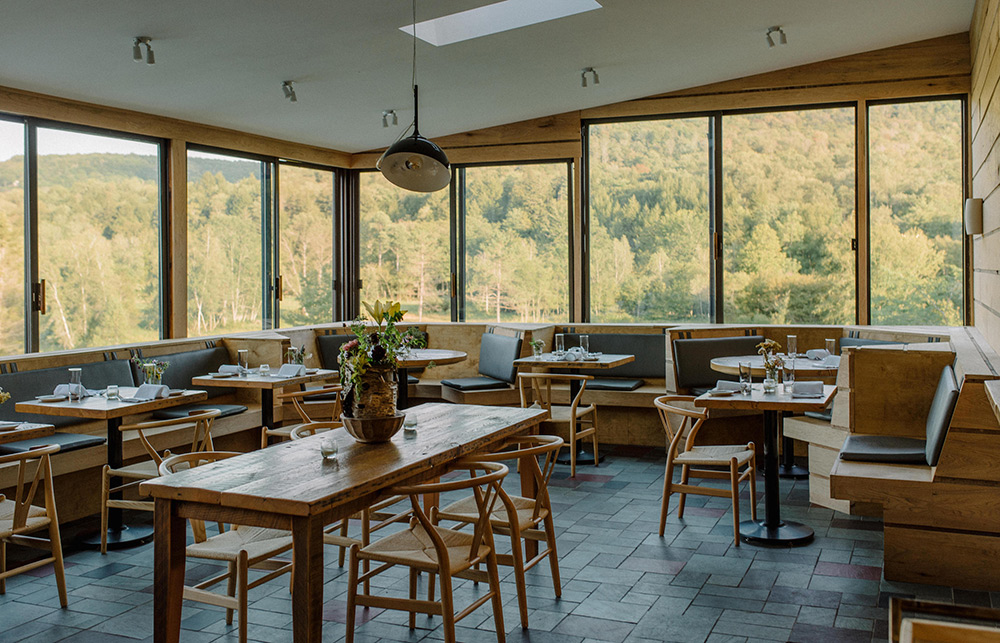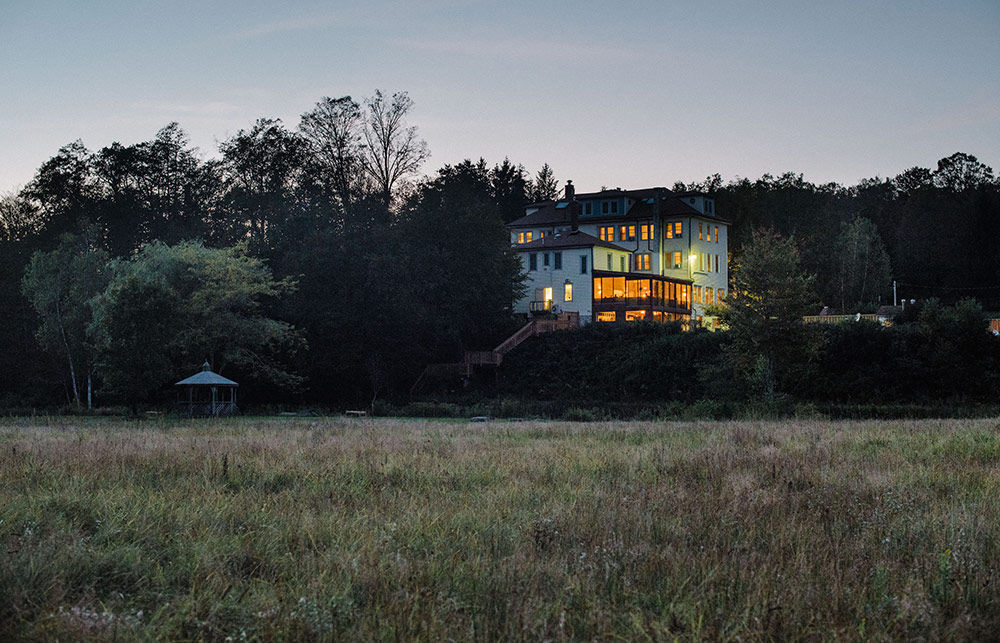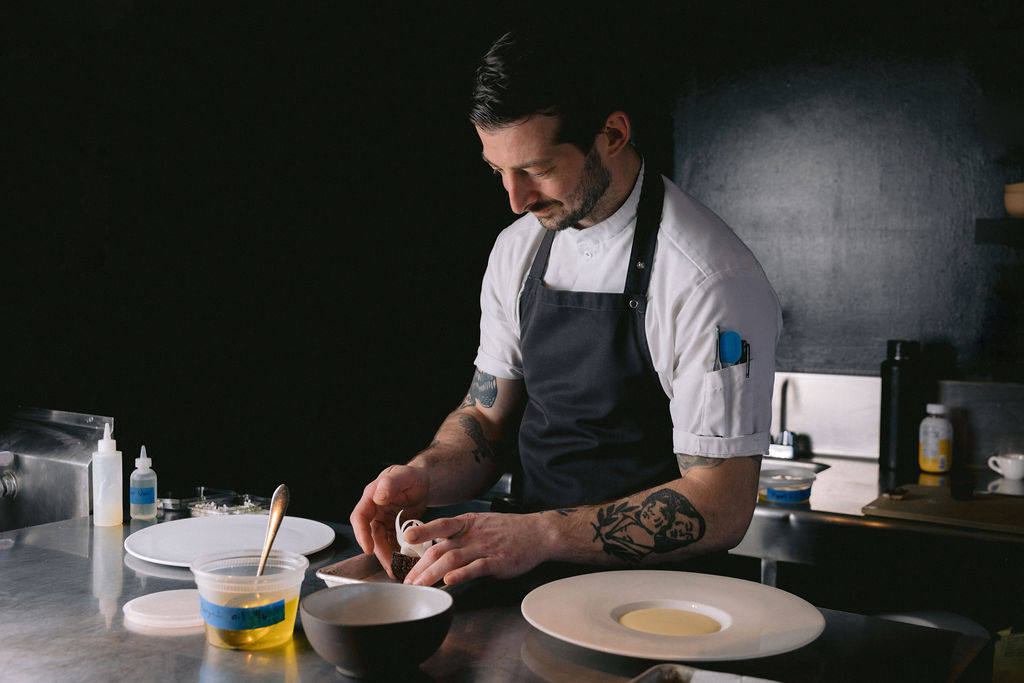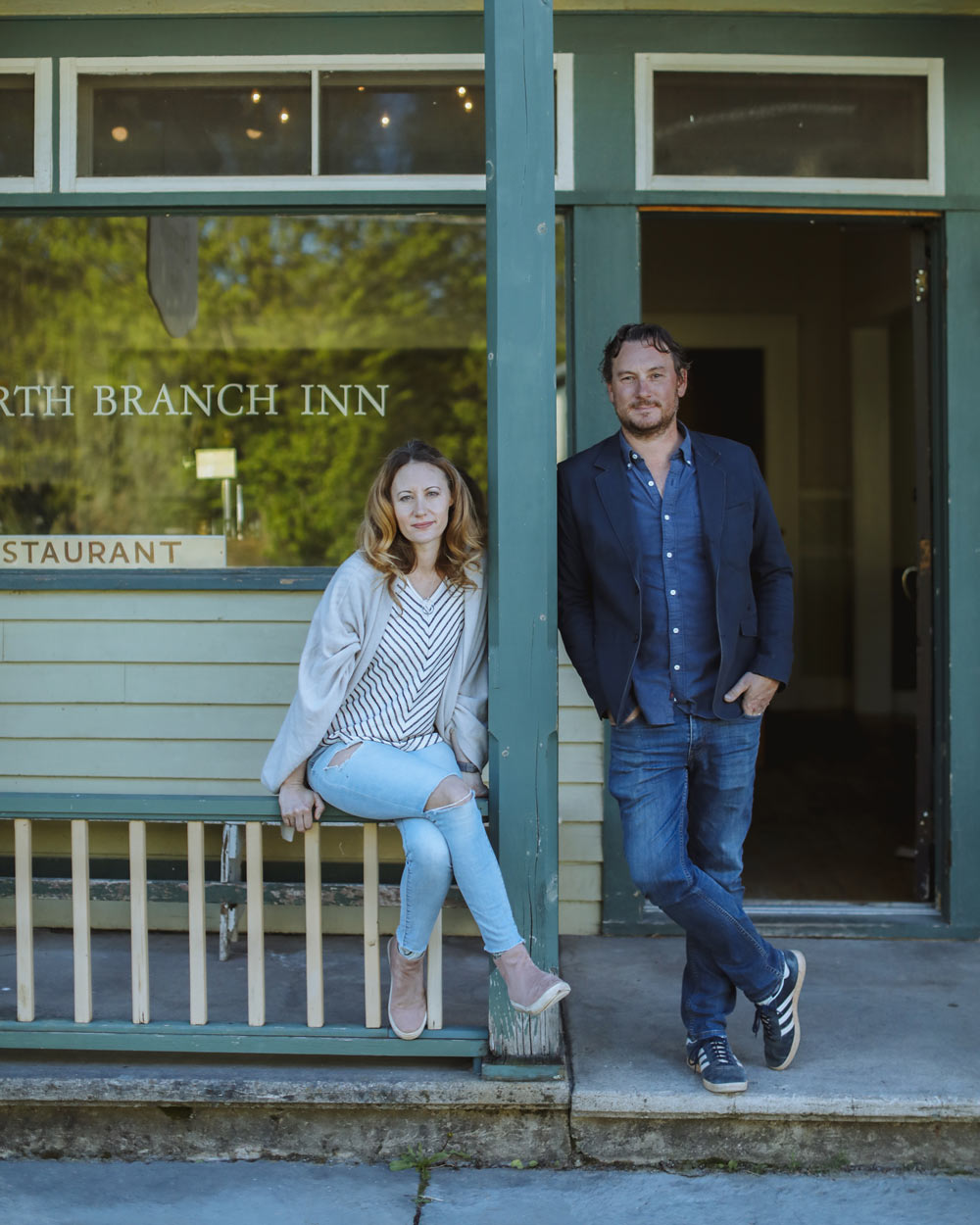
对于一家酒店的经营者来说,在疫情来袭的时候,又失去了一个曾经获奖的大厨,可谓是雪上加霜。在纽约州的利文斯顿马诺市的卡茨吉尔山上有一家名叫the DeBruce的酒店,经营该酒店的西姆斯·福斯特和克尔斯滕·哈洛·福斯特夫妇就遭遇了这样的打击。
他们在纽约以南约4小时的费城聘请了一位新的行政主厨——埃里克·列维里。列维里接手时是一个“光杆司令”,他立即重组了自己的厨师团队,就像美剧《火线重案组》第二季的丹尼尔斯警官一样。他的目标很明确——他追求的是一种慢节奏的生活方式,一份收入颇丰的工作,同时还能制作精致的本地美食(比如菌菇猪脸、鹅肝派,枫糖烤梨等等)。目前,这间现代的乡村酒店雇佣了7名费城员工,下一步还将招募更多员工。
下面,我们就让故事的主人公来亲自讲述这个小巧精干的“鹰巢”酒店向北迁徙的故事。
为简明起见,采访有删节。

西姆斯·福斯特,福斯特酒店公司老板:疫情刚开始的时候,上一任行政总厨阿克塞找到我,跟我说他因为家庭原因要走了。他是一个特别有才华的厨师,当时我的心都碎了。但他临走的时候,已经在悄悄替我物色接替他的人了。他说:“你还记得埃里克吗,两年前在这帮过厨。”
埃里克·列维里,福斯特酒店公司烹饪总监,DeBruce酒店行政总厨:2019年,我给阿克塞当过帮厨,我原来从没来过卡茨吉尔山,但DeBruce酒店曾被《时尚先生》杂志评为美国最好的餐厅之一,这吸引了我的注意。我一直很喜欢这种风格的餐厅——它有点像世界著名的瑞典Fävikens餐厅,与环境融合得特别好。我真的很喜欢这里,但当时我已经在费城的黎顿豪斯酒店的Lacroix餐厅得到了另一份工作,所以我还是留在了费城。“
福斯特:我永远不会忘记阿克塞说过的话:“作为一个厨师,埃里克可能比我更出色。”他是怀着敬意说这番话的。这句话分量很重,所以我给埃里克打了电话。
列维里:疫情刚开始的时候,我是Lacroix餐厅的主厨。很快费城的所有商家都关门了,我也不知道黎顿豪斯酒店的情况是怎样的。我团队的大部人都到一个农产品包装仓库找了份工作。

帕特里克·博恩斯,DeBruce酒店副厨师长:3月15日,我们接到了Lacroix餐厅的停业休假通知。到5月1日左右,大多数人的休假成了永久休假。再往后,所有餐馆都关门了,所以我们大多数人都开始在一个农产品包装厂里工作,因为已经没有地方需要厨师了。
列维里:我一直和阿克塞保持联系。他告诉我,他想让我联系西姆斯,争取一些机会。我根本不知道那是什么机会。后来西姆斯给我打了电话,说阿克塞要离开了,我可以得到一个行政总厨的职位。这就开启了一次完全不同的对话。
福斯特::2014年,我们开办了第一家酒店——阿诺德之家(Arnold House),当时要招募员工到卡茨吉尔山来工作是很难的。以前在我们这个行业,如果你想成为一名真正的厨师,或者你想真正在酒店行业发展,你必须去大城市。但我们越来越多地看到,人们厌倦了城市的生活,他们觉得:“这不是我下半辈子想要的生活方式。”疫情加速了这些根本性的变化,并且让人们有了更合理的借口逃离城市,去追寻一直以来内心渴望的东西。
列维里:我没有因为觉得要离开这座城市,所以就感到有些恐慌。第一次来这里的感觉是很好的,我们看着这片美丽的土地,四处走走,采采野花——当然我对此感到很内疚。
福斯特:早在“保持社交距离”成为一个成语之前,我们就在宣传这个理念。现在全世界终于相信了。
列维里:我很快就接受了这份工作,但当时好像一切都在跟我们对着干。我和我妻子蒂法当时刚订了婚,正准备结婚。我们刚在新房里住了两个月。她签了一份合同,还得在普林斯顿再工作一年。不过我们在费城倒是没有什么事,所以如果非要冒一个险的话,当时似乎正是时候。
福斯特:于是我和埃里克谈了一谈。
列维里:那是一个非常独特的招聘过程,因为我当时甚至没法再过去一次了。我完全不知道上次我帮厨结束后发生了什么。
福斯特:他甚至没办法过来试菜。
列维里:防疫措施太严格了,大家一开始都吓坏了,所以我没法去试菜。我们倒是在电话里聊了很多。坦白说,我们大部分对话都跟做菜没关系。我们谈了很多生活中重要的事情,通过这种方法,我们建立了一种真正的联系。

克里斯汀·哈洛·福斯特,福斯特酒店公司老板:和埃里克聊了几次之后,我在西姆斯的眼中看到了一丝光芒。
福斯特:当时之所以决定聘用埃里克,是由于他的个性。所以搞笑的是,当他一个月来到这里后,我说:“好吧,至少现在我知道你是会做菜的。”
博恩斯:说实话,当时我以为埃里克疯了。我当时想:“这真是一个大胆的决定。”
哈洛·福斯特:从各方面看,双方都有赌的成分,完全是出于对彼此的信任。埃里克甚至没有见过我们本人,就搬到了一个陌生的地方。而且这个地方是什么样的,你在疫情期间是很难了解的。
列维里:我5月份刚搬来的时候,厨房完全是空的。不过我手下有一两个之前的团队留下来的员工。
福斯特:我和埃里克在电话里敲定了这件事后,下一句话就是:“让我们谈谈怎么帮你招募你需要的人手。”我们在电梯里的广告词是:“放假的时候,你是想在纽约西村吃早餐,还是想去划船或远足?”
朱利安·迈耶,DeBruce行政副厨:我一直以为,要追求烹饪事业,我就必须牺牲在户外的时间。当埃里克告诉我,在这个荒无人烟的地方,还有这样一个疯狂的机会时,说实话,我觉得这个机会简直好得难以置信。
列维里:我和朱利安在我干过的每一家餐厅都共事过,但我们没有真正搭档过。我知道他住在科罗拉多州,而且对户外风格的生活很感兴趣。他也是我第一个联系的人。实际上,是蒂法联系了他。
迈耶:我和蒂法三年多前曾在费城的Zahav餐厅共事过。去年四月,也就是疫情最严重的时候,她给我发了一条信息。当时我正要开始一份新的厨师管理工作,到新公司报到那天,恰好就是费城所有餐馆关门那天,实在太可怕了。我工作过的每一家餐厅,都是一直需要厨师的。我一直觉得这里的就业市场超级稳定。但疫情完全颠覆了这一切。我原来以为自己随便走进一家餐厅都能找到工作,现在却有了走投无路的感觉。我当始还在申请上大学。所以埃里克提供这份工作的时机真是太及时了。大概没到三个星期,我就收拾东西开车赶了过来。直到我领钥匙准备搬进新住处时,我才第一次看见这家餐厅。这个公司在道路尽头有一栋房子,我们很多厨房员工都住在那里。
哈洛·福斯特:我们消除的障碍越多,就越容易帮助员工北上,在招聘上也就越容易成功。为了这个战略,我们为员工提供了6个月的临时住房。这也给了新团队成员一些时间,让他们熟悉这个地区,好让他们决定,以后把家安在旁边哪个生机勃勃的小镇或村庄里。
迈耶:这让过渡变得很顺利。我们可以免费住在这儿,我不禁会想:“最坏又能差到哪去呢?”我只在那儿待了很短一段时间,现在我和我的女朋友住在一个农场里,我们的食材就是从那里来的。
福斯特:这也是我们最吸引厨房员工的地方之一。在上班的路上,你会路过三个农场,你可以跟他们探讨一下你将要烹饪的食材。
列维里:从朱利安开始,它就像一张网一样蔓延开来。
福斯特:DeBruce的战略,是给大厨创造一个平台,来展现他的创造力,然后让他去影响他招募来的人。这样做的效果很好,因为他们会告诉人们:“快搬到乡村吧,这是一种很好的生活方式,更重要的是,这是一次改变职业发展的机会。”
本尼森·谢:DeBruce服务经理:埃里克和我起初是在Whetstone Tavern餐厅共事时认识的,当时我是一个传菜生,而埃里克和我共事过的其他厨师都不一样。他充满了激情和创造力,是一个你愿意追随的人。
列维里:本跟了我6年,干过好几个不同的角色。这种人会成为你的朋友,因为你们之间有信任。他知道我只会把他带到更好的处境里。
谢:埃里克知道,我已经有些厌倦了城市生活,早在疫情前,我就梦想一种放松的、远离喧嚣的生活。他也知道我很向往酒店行业。我本来是想2020年年底与他会合的,不过他在夏天的时候就早早联系了我,让我填补一个空缺的职位。他说:“我觉得这份工作很适合你。”所以我没有犹豫。
安德鲁·由斯特,Kenoza Hall酒吧经理:埃里克和我也是几年前在Whetstone餐厅认识的。有一天他突然提出来,要我加入DeBruce的服务团队。后来这家公司也找到了我,提出让我当Kenoza Hall的酒吧经理,那是一家最新的酒店。
基尔顿·凯勒,DeBruce服务员:这一年改变了安德鲁和我的关系,我们成了情侣,然后我们有了一次严肃的讨论:“好吧,我们要一起做这件事吗?”
尤斯特:除了宾西法尼亚州,我没住过别的地方,比如东南宾西法尼亚。
凯勒:我的背景是服装设计,我知道,等疫情平稳后,我可以重新捡起这个职业,但这是安德鲁进入管理界的第一步。所以我认为,为了他的事业发展,也为了我们的未来,来这里工作,对我们俩来说是正确的决定。
哈洛·福斯特:我不知道是不是因为西姆斯和我既是夫妻、也是生意伙伴的缘故——我们在生活上事业上都是战友,但是,我们公司里确实有很多对情侣。当我们招了一个人后,就会弄清他另一半的情况,而他的另一半往往也适合我们的职位。
博恩斯:这是一个诡异的夏天。费城的餐饮业一片萧条。我当时在费蒙特公园里卖简餐,我的同事曾在Vetri餐厅当过厨师。我们一个是Vetri的厨师,一个是Lacroix的厨师,现在竟然沦落到在快餐车里卖卷饼和热狗。
罗伯特·韦斯特,DeBruce助理厨师:我在我朋友的甜甜圈店工作。我还给一家啤酒厂工作,主要是做外卖。我是尽可能地想继续工作赚钱,你知道吗?
杰弗里·戴维森,DeBruce助理厨师:我想方设法地维持生计,甚至连包装的工作都干。我还在一家餐厅工作,但他们每周只干两天,我靠它根本没法生活。后来我在里士满港的一家小酒吧里当上了厨师。
博恩斯:城市里的很多人只能打食品打包带走吃,这些食品和我们以前做的东西根本不能相提并论。大概8月的时候,埃里克打电话告诉我,说这里有个助理厨师的职位。那个时候,在城市里,你根本没有让人坐下来吃一顿11道菜的西餐的自由。这份工作可以让我们继续磨练手艺。所以我就来了,这一走就没有离开。
韦斯特:我是在Zahav餐厅认识蒂法和朱利安的,我的上一任助理厨师则跟埃里克共事过很久。我通过小道消息听说埃里克和朱利安来了这里,所以我也开始跟朱利安谈这件事。他让我用电子邮件把简历发给埃里克。我相信朱利安,所以我知道,如果他真的愿意为埃里克工作,那我可能也会。我很喜欢城市生活,我在《费城问询报》的新闻部门工作了15年,当厨师却只有3年。我已经45岁了,是厨房里的老家伙。不过只要向埃里克学习,决定搬家就没有什么难的。
戴维森:我是厨房里年龄最小的一个,我几乎所有的知识,都是从埃里克那里学来的。我一直都跟着他,从Marigold Kitchen餐厅到Lacroix餐厅。当时,我和帕特每天都搭档工作。不过我是经历了一番劝说才搬到这里的。等到埃里克第三次问我时,我开车来到了这里,那时冬天都要过去了。我的车是前驱的,在开车来的路上,冰雪还把我车子的制动功能弄坏了。
福斯特:一次我问几个潜在员工:“你对冬天怎么看?”因为这里真的是有冬天的。
戴维森:我来晚了一天,不过还是成功了。两周前,我和我女朋友带着我们的狗和猫搬了过来。
博恩斯:原Lacroix餐厅的团队还有更多人加入进来。这就像埃里克在疫情前召集他的旧团队一样。
列维里:跟着领导走,并不一定是餐饮行业的独特习惯。不过你不管走到那里,都能带来10到12个人,这种感觉很奇怪,但也很有成就感。
戴维森:这里非常注重团队合作。这种感觉很好,因为你会觉得有人在支持你,而不是仅仅为了活着而挣扎。我们会坐下来一起吃工作餐。我们还会讨论休息日怎么一起出去玩。我们在都以费城的那种奇怪的方式联系在一起。
博恩斯:费城一向被视为纽约的小兄弟,尤其是在美食上。现在我们有很多事情要证明,而且我们已经杀到了纽约的后院。
列维里:在弗城这样的大城市,几乎所有的厨师,几乎都有陷入自我怀疑的问题。因为大城市有很多美食媒体和餐厅,我必须要跟他们比……我很享受现在这种距离感。现在我只专注于和我的团队在一起,做我们喜欢的食物,并确保我们做出来的,都是我们相信的美食。我一度曾经认为我是世界上最糟糕的厨师,但现在大家都愿意在这里工作,或许说明我以前的感觉并不正确。(财富中文网)
译者:朴成奎
对于一家酒店的经营者来说,在疫情来袭的时候,又失去了一个曾经获奖的大厨,可谓是雪上加霜。在纽约州的利文斯顿马诺市的卡茨吉尔山上有一家名叫the DeBruce的酒店,经营该酒店的西姆斯·福斯特和克尔斯滕·哈洛·福斯特夫妇就遭遇了这样的打击。
他们在纽约以南约4小时的费城聘请了一位新的行政主厨——埃里克·列维里。列维里接手时是一个“光杆司令”,他立即重组了自己的厨师团队,就像美剧《火线重案组》第二季的丹尼尔斯警官一样。他的目标很明确——他追求的是一种慢节奏的生活方式,一份收入颇丰的工作,同时还能制作精致的本地美食(比如菌菇猪脸、鹅肝派,枫糖烤梨等等)。目前,这间现代的乡村酒店雇佣了7名费城员工,下一步还将招募更多员工。
下面,我们就让故事的主人公来亲自讲述这个小巧精干的“鹰巢”酒店向北迁徙的故事。
为简明起见,采访有删节。
西姆斯·福斯特,福斯特酒店公司老板:疫情刚开始的时候,上一任行政总厨阿克塞找到我,跟我说他因为家庭原因要走了。他是一个特别有才华的厨师,当时我的心都碎了。但他临走的时候,已经在悄悄替我物色接替他的人了。他说:“你还记得埃里克吗,两年前在这帮过厨。”
埃里克·列维里,福斯特酒店公司烹饪总监,DeBruce酒店行政总厨:2019年,我给阿克塞当过帮厨,我原来从没来过卡茨吉尔山,但DeBruce酒店曾被《时尚先生》杂志评为美国最好的餐厅之一,这吸引了我的注意。我一直很喜欢这种风格的餐厅——它有点像世界著名的瑞典Fävikens餐厅,与环境融合得特别好。我真的很喜欢这里,但当时我已经在费城的黎顿豪斯酒店的Lacroix餐厅得到了另一份工作,所以我还是留在了费城。“
福斯特:我永远不会忘记阿克塞说过的话:“作为一个厨师,埃里克可能比我更出色。”他是怀着敬意说这番话的。这句话分量很重,所以我给埃里克打了电话。
列维里:疫情刚开始的时候,我是Lacroix餐厅的主厨。很快费城的所有商家都关门了,我也不知道黎顿豪斯酒店的情况是怎样的。我团队的大部人都到一个农产品包装仓库找了份工作。
帕特里克·博恩斯,DeBruce酒店副厨师长:3月15日,我们接到了Lacroix餐厅的停业休假通知。到5月1日左右,大多数人的休假成了永久休假。再往后,所有餐馆都关门了,所以我们大多数人都开始在一个农产品包装厂里工作,因为已经没有地方需要厨师了。
列维里:我一直和阿克塞保持联系。他告诉我,他想让我联系西姆斯,争取一些机会。我根本不知道那是什么机会。后来西姆斯给我打了电话,说阿克塞要离开了,我可以得到一个行政总厨的职位。这就开启了一次完全不同的对话。
福斯特::2014年,我们开办了第一家酒店——阿诺德之家(Arnold House),当时要招募员工到卡茨吉尔山来工作是很难的。以前在我们这个行业,如果你想成为一名真正的厨师,或者你想真正在酒店行业发展,你必须去大城市。但我们越来越多地看到,人们厌倦了城市的生活,他们觉得:“这不是我下半辈子想要的生活方式。”疫情加速了这些根本性的变化,并且让人们有了更合理的借口逃离城市,去追寻一直以来内心渴望的东西。
列维里:我没有因为觉得要离开这座城市,所以就感到有些恐慌。第一次来这里的感觉是很好的,我们看着这片美丽的土地,四处走走,采采野花——当然我对此感到很内疚。
福斯特:早在“保持社交距离”成为一个成语之前,我们就在宣传这个理念。现在全世界终于相信了。
列维里:我很快就接受了这份工作,但当时好像一切都在跟我们对着干。我和我妻子蒂法当时刚订了婚,正准备结婚。我们刚在新房里住了两个月。她签了一份合同,还得在普林斯顿再工作一年。不过我们在费城倒是没有什么事,所以如果非要冒一个险的话,当时似乎正是时候。
福斯特:于是我和埃里克谈了一谈。
列维里:那是一个非常独特的招聘过程,因为我当时甚至没法再过去一次了。我完全不知道上次我帮厨结束后发生了什么。
福斯特:他甚至没办法过来试菜。
列维里:防疫措施太严格了,大家一开始都吓坏了,所以我没法去试菜。我们倒是在电话里聊了很多。坦白说,我们大部分对话都跟做菜没关系。我们谈了很多生活中重要的事情,通过这种方法,我们建立了一种真正的联系。
克里斯汀·哈洛·福斯特,福斯特酒店公司老板:和埃里克聊了几次之后,我在西姆斯的眼中看到了一丝光芒。
福斯特:当时之所以决定聘用埃里克,是由于他的个性。所以搞笑的是,当他一个月来到这里后,我说:“好吧,至少现在我知道你是会做菜的。”
博恩斯:说实话,当时我以为埃里克疯了。我当时想:“这真是一个大胆的决定。”
哈洛·福斯特:从各方面看,双方都有赌的成分,完全是出于对彼此的信任。埃里克甚至没有见过我们本人,就搬到了一个陌生的地方。而且这个地方是什么样的,你在疫情期间是很难了解的。
列维里:我5月份刚搬来的时候,厨房完全是空的。不过我手下有一两个之前的团队留下来的员工。
福斯特:我和埃里克在电话里敲定了这件事后,下一句话就是:“让我们谈谈怎么帮你招募你需要的人手。”我们在电梯里的广告词是:“放假的时候,你是想在纽约西村吃早餐,还是想去划船或远足?”
朱利安·迈耶,DeBruce行政副厨:我一直以为,要追求烹饪事业,我就必须牺牲在户外的时间。当埃里克告诉我,在这个荒无人烟的地方,还有这样一个疯狂的机会时,说实话,我觉得这个机会简直好得难以置信。
列维里:我和朱利安在我干过的每一家餐厅都共事过,但我们没有真正搭档过。我知道他住在科罗拉多州,而且对户外风格的生活很感兴趣。他也是我第一个联系的人。实际上,是蒂法联系了他。
迈耶:我和蒂法三年多前曾在费城的Zahav餐厅共事过。去年四月,也就是疫情最严重的时候,她给我发了一条信息。当时我正要开始一份新的厨师管理工作,到新公司报到那天,恰好就是费城所有餐馆关门那天,实在太可怕了。我工作过的每一家餐厅,都是一直需要厨师的。我一直觉得这里的就业市场超级稳定。但疫情完全颠覆了这一切。我原来以为自己随便走进一家餐厅都能找到工作,现在却有了走投无路的感觉。我当始还在申请上大学。所以埃里克提供这份工作的时机真是太及时了。大概没到三个星期,我就收拾东西开车赶了过来。直到我领钥匙准备搬进新住处时,我才第一次看见这家餐厅。这个公司在道路尽头有一栋房子,我们很多厨房员工都住在那里。
哈洛·福斯特:我们消除的障碍越多,就越容易帮助员工北上,在招聘上也就越容易成功。为了这个战略,我们为员工提供了6个月的临时住房。这也给了新团队成员一些时间,让他们熟悉这个地区,好让他们决定,以后把家安在旁边哪个生机勃勃的小镇或村庄里。
迈耶:这让过渡变得很顺利。我们可以免费住在这儿,我不禁会想:“最坏又能差到哪去呢?”我只在那儿待了很短一段时间,现在我和我的女朋友住在一个农场里,我们的食材就是从那里来的。
福斯特:这也是我们最吸引厨房员工的地方之一。在上班的路上,你会路过三个农场,你可以跟他们探讨一下你将要烹饪的食材。
列维里:从朱利安开始,它就像一张网一样蔓延开来。
福斯特:DeBruce的战略,是给大厨创造一个平台,来展现他的创造力,然后让他去影响他招募来的人。这样做的效果很好,因为他们会告诉人们:“快搬到乡村吧,这是一种很好的生活方式,更重要的是,这是一次改变职业发展的机会。”
本尼森·谢:DeBruce服务经理:埃里克和我起初是在Whetstone Tavern餐厅共事时认识的,当时我是一个传菜生,而埃里克和我共事过的其他厨师都不一样。他充满了激情和创造力,是一个你愿意追随的人。
列维里:本跟了我6年,干过好几个不同的角色。这种人会成为你的朋友,因为你们之间有信任。他知道我只会把他带到更好的处境里。
谢:埃里克知道,我已经有些厌倦了城市生活,早在疫情前,我就梦想一种放松的、远离喧嚣的生活。他也知道我很向往酒店行业。我本来是想2020年年底与他会合的,不过他在夏天的时候就早早联系了我,让我填补一个空缺的职位。他说:“我觉得这份工作很适合你。”所以我没有犹豫。
安德鲁·由斯特,Kenoza Hall酒吧经理:埃里克和我也是几年前在Whetstone餐厅认识的。有一天他突然提出来,要我加入DeBruce的服务团队。后来这家公司也找到了我,提出让我当Kenoza Hall的酒吧经理,那是一家最新的酒店。
基尔顿·凯勒,DeBruce服务员:这一年改变了安德鲁和我的关系,我们成了情侣,然后我们有了一次严肃的讨论:“好吧,我们要一起做这件事吗?”
尤斯特:除了宾西法尼亚州,我没住过别的地方,比如东南宾西法尼亚。
凯勒:我的背景是服装设计,我知道,等疫情平稳后,我可以重新捡起这个职业,但这是安德鲁进入管理界的第一步。所以我认为,为了他的事业发展,也为了我们的未来,来这里工作,对我们俩来说是正确的决定。
哈洛·福斯特:我不知道是不是因为西姆斯和我既是夫妻、也是生意伙伴的缘故——我们在生活上事业上都是战友,但是,我们公司里确实有很多对情侣。当我们招了一个人后,就会弄清他另一半的情况,而他的另一半往往也适合我们的职位。
博恩斯:这是一个诡异的夏天。费城的餐饮业一片萧条。我当时在费蒙特公园里卖简餐,我的同事曾在Vetri餐厅当过厨师。我们一个是Vetri的厨师,一个是Lacroix的厨师,现在竟然沦落到在快餐车里卖卷饼和热狗。
罗伯特·韦斯特,DeBruce助理厨师:我在我朋友的甜甜圈店工作。我还给一家啤酒厂工作,主要是做外卖。我是尽可能地想继续工作赚钱,你知道吗?
杰弗里·戴维森,DeBruce助理厨师:我想方设法地维持生计,甚至连包装的工作都干。我还在一家餐厅工作,但他们每周只干两天,我靠它根本没法生活。后来我在里士满港的一家小酒吧里当上了厨师。
博恩斯:城市里的很多人只能打食品打包带走吃,这些食品和我们以前做的东西根本不能相提并论。大概8月的时候,埃里克打电话告诉我,说这里有个助理厨师的职位。那个时候,在城市里,你根本没有让人坐下来吃一顿11道菜的西餐的自由。这份工作可以让我们继续磨练手艺。所以我就来了,这一走就没有离开。
韦斯特:我是在Zahav餐厅认识蒂法和朱利安的,我的上一任助理厨师则跟埃里克共事过很久。我通过小道消息听说埃里克和朱利安来了这里,所以我也开始跟朱利安谈这件事。他让我用电子邮件把简历发给埃里克。我相信朱利安,所以我知道,如果他真的愿意为埃里克工作,那我可能也会。我很喜欢城市生活,我在《费城问询报》的新闻部门工作了15年,当厨师却只有3年。我已经45岁了,是厨房里的老家伙。不过只要向埃里克学习,决定搬家就没有什么难的。
戴维森:我是厨房里年龄最小的一个,我几乎所有的知识,都是从埃里克那里学来的。我一直都跟着他,从Marigold Kitchen餐厅到Lacroix餐厅。当时,我和帕特每天都搭档工作。不过我是经历了一番劝说才搬到这里的。等到埃里克第三次问我时,我开车来到了这里,那时冬天都要过去了。我的车是前驱的,在开车来的路上,冰雪还把我车子的制动功能弄坏了。
福斯特:一次我问几个潜在员工:“你对冬天怎么看?”因为这里真的是有冬天的。
戴维森:我来晚了一天,不过还是成功了。两周前,我和我女朋友带着我们的狗和猫搬了过来。
博恩斯:原Lacroix餐厅的团队还有更多人加入进来。这就像埃里克在疫情前召集他的旧团队一样。
列维里:跟着领导走,并不一定是餐饮行业的独特习惯。不过你不管走到那里,都能带来10到12个人,这种感觉很奇怪,但也很有成就感。
戴维森:这里非常注重团队合作。这种感觉很好,因为你会觉得有人在支持你,而不是仅仅为了活着而挣扎。我们会坐下来一起吃工作餐。我们还会讨论休息日怎么一起出去玩。我们在都以费城的那种奇怪的方式联系在一起。
博恩斯:费城一向被视为纽约的小兄弟,尤其是在美食上。现在我们有很多事情要证明,而且我们已经杀到了纽约的后院。
列维里:在弗城这样的大城市,几乎所有的厨师,几乎都有陷入自我怀疑的问题。因为大城市有很多美食媒体和餐厅,我必须要跟他们比……我很享受现在这种距离感。现在我只专注于和我的团队在一起,做我们喜欢的食物,并确保我们做出来的,都是我们相信的美食。我一度曾经认为我是世界上最糟糕的厨师,但现在大家都愿意在这里工作,或许说明我以前的感觉并不正确。(财富中文网)
译者:朴成奎
Inside the dining room at the DeBruce.LAWRENCE BRAUN
Losing your award-winning chef is not a great way for hoteliers to begin a pandemic. But that’s exactly what happened to Sims Foster and Kirsten Harlow Foster, the first couple of third-wave Catskills hospitality, at their culinary-focused property, the DeBruce, in the mountain hollow of Livingston Manor, N.Y.
They found their new executive chef, Eric Leveillee, four hours south in Philadelphia. Leveillee inherited a ghost kitchen and immediately began reassembling his old team like Lieutenant Daniels in the second season of The Wire. The pitch was straightforward: a slower, outdoors lifestyle and gainful employment, with the ability to cook the kind of intricate, place-rooted cuisine (truffled pork cheek and foie gras pie; embers-roasted pear glazed in birch syrup) that had vanished in cities during the shutdown. At current count, this modern country inn employs seven former Philadelphians, with more on the way.
Here’s the story of how this tight-knit Eagles nest made its way north, in their own words.
These interviews have been lightly edited and condensed for clarity.
Sims Foster, owner, Foster Supply Hospitality: At the very beginning of the pandemic, Aksel [Theilkuhl, former executive chef of the DeBruce] came to me and told me he was leaving for family reasons. He was immensely talented, and my heart was broken. But as he was leaving, he was softly recruiting his replacement. He said, “Do you remember Eric, the guy who staged two years ago?”
Eric Leveillee, culinary director, Foster Supply Hospitality, and executive chef, the DeBruce: I staged for Aksel for a sous chef position in 2019. I had never been to the Catskills before, but the DeBruce was named one of the best restaurants in the country in Esquire, and that piqued my attention. I’ve always loved this style of restaurant—the Fävikens of the world, just very in touch with their surroundings. I really loved it up here, but I got another offer, to work at Lacroix at the Rittenhouse [hotel], and it was too good to pass up, so I wound up staying in Philly.
Foster: I’ll never forget what Aksel said: “Eric might be a better cook than me.” He said it with reverence. It carried a lot of weight. So I called Eric.
Leveillee: I was chef de cuisine at Lacroix when the pandemic hit. Everything in Philly was totally shut down, and I had no idea what was going on with the Rittenhouse. Most of my team, we all took jobs at a produce packing warehouse.
Patrick Bones, sous chef, the DeBruce: We were furloughed from Lacroix on March 15, and that furlough was made into a permanent level for most of us around May 1. After that, all the restaurants were closed, so most of us got jobs at a produce packing plant because there was nowhere to cook or serve.
Leveillee: I had stayed in touch with Aksel, and he told me that he wanted to put me in touch with Sims about some opportunity. I had no idea what it was. When Sims called and told me Aksel was actually leaving and the [executive chef] position was available, that opened up a whole different conversation.
Foster: When we opened our first hotel, the Arnold House, in 2014, it was really, really tough [to recruit staff to relocate to the Catskills]. It used to be in our industry, if you wanted to be a serious chef or serious in hospitality you had to be in [a big city]. But more and more we’re seeing people do their time in the city and say, “That’s not the lifestyle I want for the rest of my life.” The pandemic has accelerated these fundamental changes and has actually given people a more reasonable excuse to flee the city and pursue probably what was in their hearts all along.
Leveillee: I wasn’t panicking like, “Oh, I need to get out of this city,” but it was really nice. I remember when we first came up here, we were looking across the beautiful land, walking around, picking wildflowers. I felt very guilty about it.
Foster: We’ve been touting social distancing before it was even a term, and now the world has caught up.
Leveillee: I was sold on [the job] pretty immediately, but every possible thing was kind of lined up against us. My wife, Deva, and I were recently engaged and about to get married. We had been in our new house for two months. She was contracted to work in Princeton for another year. But there was nothing going on for us in Philly, so if there was ever a time to take a risk, it seemed like this was the time.
Foster: Eric and I started talking.
Leveillee: It was a very unique recruitment process because I couldn’t see the restaurant again. I had no idea what had occurred since my stage.
Foster: He couldn’t even come to a tasting.
Leveillee: COVID protocols were so strict, and everybody was so freaked out in the very beginning that it was just not possible. So we chatted a lot on the phone, and, honestly, most of our conversations weren’t about food. We talked a lot about all the other things that we find important in life, and I think that we made a real connection in that way.
Kirsten Harlow Foster, owner, Foster Supply Hospitality: I saw a little glimmer in [Sims’s] eyes after talking to Eric a few times.
Foster: The judgment to hire Eric was based off personality, so the big joke was when he got here, after about a month, I said, “Well, at least I know you can cook now.”
Bones: I’m not gonna lie, I thought Eric was crazy. I was like, “That’s a really bold move.”
Harlow Foster: It was a leap-of-faith moment on all sides. Eric hadn’t even met us in person, and he moved to an area that it was very hard to get to know [during a pandemic].
Leveillee: I moved up in May and walked into a totally empty kitchen. I had one or two staff members that remained from the previous team.
Foster: Probably as soon as Eric and I agreed on the phone that he was going to take the job, I’m sure the next sentence was, “Let’s talk about how I help you recruit the people you need to bring.” Our elevator pitch is: “Do you want to have brunch in the West Village on your day off, or do you want to go kayaking and hiking?”
Julian Meier, executive sous chef, the DeBruce: I always felt that spending time outside was just going to be something I had to sacrifice in order to pursue my cooking career. When Eric told me about this crazy opportunity in the middle of nowhere, to be honest, it sounded almost too good to be true.
Leveillee: Julian and I had actually worked together at almost every restaurant I’ve [cooked at], but we just never really lined up. I knew that he had lived in Colorado and was interested in a more outdoorsy kind of life. He was the first person I reached out to. Actually, Deva reached out to him.
Meier: Deva and I had worked together at Zahav a little more than three years ago. It was April, the height of the pandemic, when she messaged me. I was about to start a new chef management job, and the start date happened to be the day that all restaurants in Philly shut down. It was horrible. Every restaurant I’ve ever worked in, they always need cooks and chefs; it always just felt like a super-stable job market. But [the pandemic] completely flipped it on its head, and I went from feeling like I could walk into most restaurants in the city and find a job to really just like scratching my head when it came to what was going to be next for me. I was actually reapplying for college, so the timing [of Eric’s offer] was super fortuitous. I think within three weeks, I was packing my car and heading up here. I had never ever seen the restaurant until I went to pick up my keys for the house I was going to be living in. The company owns a house down the road, where a lot of our kitchen staff live.
Harlow Foster: The more barriers we can eliminate to help enable someone to make the move upstate, the more success we have in recruitment. Offering six months of temporary staff housing has been a critical component of this strategy. It also gives new team members some time to become more familiar with the area before they have to decide which of the many small but vibrant towns and hamlets they want to call home.
Meier: It made the transition really seamless. To be able to live up here for free, it was like, “What’s the worst that could happen?” I was there for a short amount of time, and now my girlfriend and I are living on one of the farms where we get our produce from.
Foster: This is part of the appeal for culinary people, being able to stop at three farms on your way to work to talk to them about the product that you’re cooking with.
Leveillee: From Julian it started to spread like a web.
Foster: Our strategy at the DeBruce was to create a platform for a chef to execute their absolute creative vision, and then they’re able to sell that to the people they recruit. It starts to waterfall down because they’re telling people, “Come move to the country. It’s a good lifestyle, but more important, this is a career-changing move.”
Benison Tsieh, service manager, the DeBruce: Eric and I first worked together at Whetstone Tavern. I was a food runner, and Eric was not like any other chef that I had worked with. He was passionate and creative, somebody that you were willing to follow.
Leveillee: Ben’s been with me for six years in various different roles. These people become your friends. There’s trust. He knows I would only steer him into a situation that was good for him.
Tsieh: Eric knew I was a little tired of city life, even before COVID, and that I wanted something relaxed and no hustle-bustle. And he knows I care a lot about the hospitality world. My intention was to be up there with him at the end of [2020], but he reached out pretty early during the summer and asked me to fill an open position. He said, “I think it’s a right fit for you,” so I didn’t hesitate.
Andrew Yoast, bar manager, Kenoza Hall: Eric and I worked together years ago at Whetstone. He hit me up out of the blue about becoming part of the service team at the DeBruce, but then [Foster Supply] came back to me with the [bar manager] position at Kenoza Hall, which is the newest hotel.
Kierceton Keller, guest services, the DeBruce: It was a year and change into Andrew and my relationship, and there was this very serious moment of “Okay, are we doing this together?”
Yoast: I’ve never lived anywhere besides Pennsylvania, like, Southeastern Pennsylvania.
Keller: My background is in costume design, and I knew I could pick up that career when [COVID] subsided, but this was Andrew’s first step into the managerial world. So I think to further his career and look more to our future, it was the right decision for both of us to move up here.
Harlow Foster: I don’t know if it has to do with the fact that Sims and I are husband and wife but also business partners—a team both professionally and in our personal lives—but we we have a tremendous amount of couples who work in our company. When we recruit one person and then find out about their other half, it’s usually just as much of a great fit.
Bones: It was a bizarre summer. The restaurant industry in Philadelphia was in shambles. I was working in Fairmount Park at a place called Parks on Tap with another guy who was a sous chef for [Marc] Vetri. So you had a chef from Vetri and me, a chef from Lacroix, serving pretzels and hot dogs in a trailer.
Robert West, sous chef, the DeBruce: I worked at my friend’s doughnut place; I was the chef at a brewery when they were trying to get their takeout together, just doing what I could to keep working, you know?
Jeffrey Davidson, sous chef, the DeBruce: I did whatever I could to make ends meet. I did the produce packing. I worked at a restaurant where they were offering only two days a week, and I just couldn’t live off that. I wound up cooking in a little bar in Port Richmond.
Bones: A lot of people in the city were having to make food to-go and things that just didn’t correlate to the caliber of food that we were cooking before. Eric called me and told me that he had a sous chef position around August. At that time in the city, you didn’t have the freedom to have people sit down to an 11-course tasting menu. This job let us continue working on our craft. I came up here and never left.
West: I knew Deva and Julian from Zahav, and my last sous chef had worked with Eric a lot. I knew through the grapevine that Eric and Julian had come up here, and I started talking to Julian about it, and he told me to email my résumé to Eric. I trusted Julian, so I knew that if he was really into working for Eric, then I probably would too. I’m very much a city dude; I worked in news, for the Philadelphia Inquirer, for 15 years and have only been cooking for three. I’m 45, the old guy in the kitchen, so to be able to learn from Eric [made the decision to relocate] a no-brainer.
Davidson: I’m the youngest one in the kitchen, and I have learned pretty much everything I know from [Eric]. I’ve kinda just been following him around, from Marigold Kitchen to Lacroix, where Pat and I worked on the line directly next to each other every day. But it took me a little bit [to be persuaded to relocate]. I think after the third time of Eric asking me, I drove up here to stage at the tail end of winter. I have front-wheel drive, and the ice destroyed my brakes on my way up here.
Foster: One thing we ask [potential employees] is, “How do you feel about winter?” Because it happens here.
Davidson: I was a day late for my stage, but it worked out. Two weeks ago, my girlfriend and I moved up with our dog and cat.
Bones: We have even more people from Lacroix coming up. It’s like [Eric] is reassembling the old team we had prior to the pandemic.
Leveillee: [Following a boss] isn’t necessarily unique to the restaurant industry, but it is bizarre—in a really great way—to be able to take 10 or 12 people with you wherever you go.
Davidson: It’s very teamwork-oriented here. It’s honestly a good feeling because it makes you feel like people have your back rather than, you know, just fighting to stay alive. We all sit down and have a staff meal together. We all talk about hanging out on our days off. It’s a good feeling. We’re all connected in that weird Philadelphia way.
Bones: Philly is always treated as New York’s little brother, as far as dining. We have a lot to prove now that we’re in their backyard.
Leveillee: Chefs have weird self-doubt issues pretty much across the board, and in a city like Philadelphia, where there’s a lot of food media and a lot of restaurants to compare myself with…I’ve really enjoyed being separated from that a little bit. Now I just focus on being with my team, cooking the food that we love to cook, and making sure that we’re putting out a product we all believe in. I used to think that I was the worst chef in the world, but I think the fact that people want to work here, maybe signifies something different.






